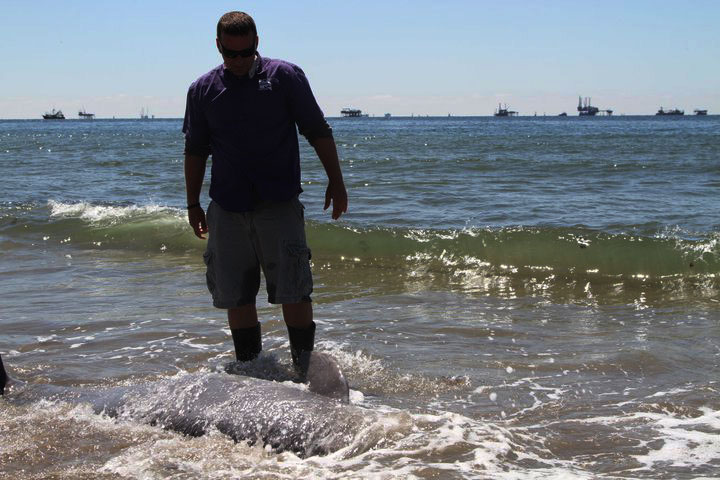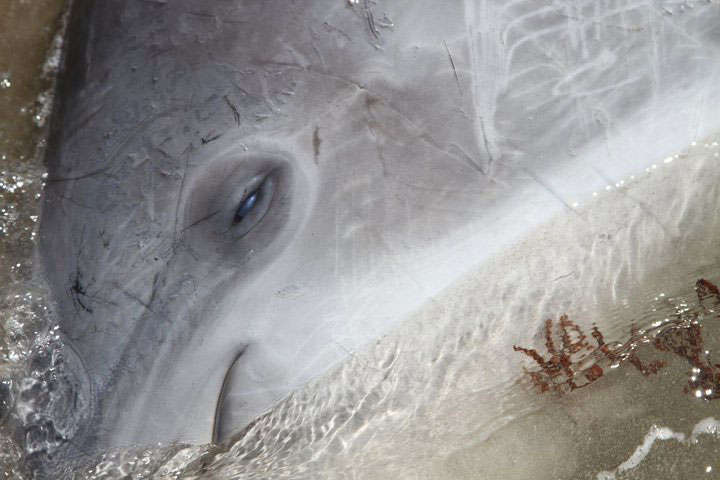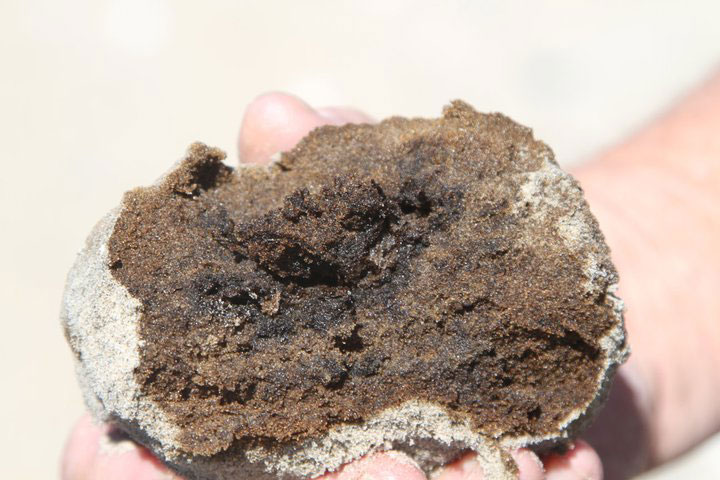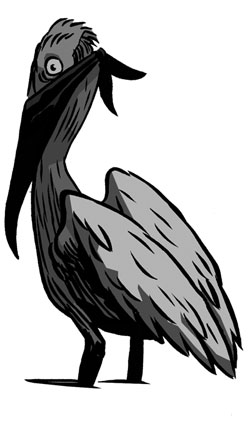by Dr. Antoine Schlumberger
We were out with the landowner of Fourchon Beach, discussing BP’s role in oiling this barrier island west of Grand Isle– it had a low profile, a long history of hemorrhaging sand pre- and post-Katrina, because of its position, because of the port breakwaters, as well as its disintegration by the cleanup crews BP sent down to remove some oil and ignore other oil.
The storms that had built and destroyed the beach had now layered BP’s oil thoroughly into the fabric of the island itself. After April 20th, 2010, the island’s destiny was to serve as a toxic landfill, rather than one of Louisiana’s few beaches. Oil and tar from under the seafloor of the Mississippi Canyon was now a core component of the mass of the island.
 “Wait, a dolphin,” someone yelled over the grumble of the motor, and we stopped the UTV to find an 8-foot mammal stranded in the sand. The land manager got on the mobile to the local fish cops, LDWF, on the next island over. They were in charge of processing dolphins and whales suspected of dying by BP’s oily disaster. i had spent all last summer in a kind of denial that the oil was happening, and so instead had volunteered in LDWF’s new, giant air-conditioned facility to stuff sampling packs with the kind of gear biological staff would need to scrape oil from the dolphins’ skin, and to sample and store animal tissues for genetic identification. At the time i questioned whether my packs would ever be used; now i knew it would be better if they all sat on a shelf until the Gulf of Mexico swallows us all.
“Wait, a dolphin,” someone yelled over the grumble of the motor, and we stopped the UTV to find an 8-foot mammal stranded in the sand. The land manager got on the mobile to the local fish cops, LDWF, on the next island over. They were in charge of processing dolphins and whales suspected of dying by BP’s oily disaster. i had spent all last summer in a kind of denial that the oil was happening, and so instead had volunteered in LDWF’s new, giant air-conditioned facility to stuff sampling packs with the kind of gear biological staff would need to scrape oil from the dolphins’ skin, and to sample and store animal tissues for genetic identification. At the time i questioned whether my packs would ever be used; now i knew it would be better if they all sat on a shelf until the Gulf of Mexico swallows us all.
If we were lucky, the animal could be autopsied, and maybe we’d be able to receive confirmation that it was autopsied, if we called three or four staff once a month for a few months, asking and asking again. Ten to twenty years from today, when the lawyers were done arguing the matter, 20 years from our phone call– maybe then we could find out the results of the autopsy, and whether this animal had been legally confirmed killed by BP.
i felt its smooth trunk, and searched for a pulse with my fingers. How do you feel for a pulse on a dolphin? Can you? It was warm, and i checked its blowhole for movement or reflex or response, figuring that this mammal would be like us in that regard– if it were alive, it’d be breathing air. But it was dead. i felt i saw its soul struggling out of its carcass, but it was only the ebb and flow of the waves, pushing and pulling the animal like a marionette, moving its muscles and tendons in a slow pantomime of the struggle for life. i let myself know what the animal’s grey eye had first told me: there was no life here. The scratches over its face and body told of an animal vigorously scratching itself against a reef, struggling to get out of its skin before it died. i tried not to think about it.
It was freshly dead, so i thought it was good that at least we were there. It had a chance to be counted as a criminal charge against a set of assholes so evil i shook with the desire to lead them by the eye sockets and to stuff them into the deepest darkest coldest hole known to man. A deepwater oil well, even. Or maybe their own assholes.
Having grown up in the city, i’ve seen a body or two lying in the street. There’s a moment you face of wondering whether it’s worth it to get involved; although i usually have, i now recognize how much privilege i was born into to be able to contemplate the question. My attraction to the dolphin didn’t seem all that different from the time i saw Ms. Wynn sprawled out on the road, dead from a motorist who didn’t care for her cycling…. or from the more regular sight of strewn bodies of the wasted, rank not from rot but from drink, dead only in their souls, their breath all too active… from the cry of a prone old woman on Music St., her body unresponsive to her commands, her head bleeding profusely. What makes one act for his fellows? Why was this dolphin calling to that same instinct to help and triggering that fear of involvement?
 i stood there staring into its clouded eye wondering how the hell was i born into this mess, contemplating the cost of my existence. i was the true grandchild of an oil geologist who talked in hushed tones about the job he did watching mud pumped out from under the marsh, making the money for my grandmother to raise children, my father, in a middle class family, now leaving me the task to clean up the mess that seems the price for my existence.
i stood there staring into its clouded eye wondering how the hell was i born into this mess, contemplating the cost of my existence. i was the true grandchild of an oil geologist who talked in hushed tones about the job he did watching mud pumped out from under the marsh, making the money for my grandmother to raise children, my father, in a middle class family, now leaving me the task to clean up the mess that seems the price for my existence.
“Fight corporate power. Water is worth much more than gold. Don’t let the bastards grind you down.”
If only it were that simple. All the land in this conservation easement, this vanishing preserve for birds where i stood, was purchased by the black revenue flowing beneath the surface in a cold metal pipe feeding America a tenth of its supply. The birds nesting on the restricted-access beach all around me were dependent upon that revenue, flowing beneath me in a stupid metal pipe like America’s central line.
My father would not have been born without that dark revenue. i would not have been conceived without its dark power. i felt junk sick for Louisiana. i felt its subterranean power like a pulsing muscle under me, over me, i felt like a fragile child that must cling to its stalwart mother to stand. The island had already been restored, patched together, and would be again, with taxes on oil revenue. Oil and oil revenue moved the men to move their oil-fueled machines to pump sand back onto the island, in a desperate dance to replace what the river used to do with great floods. The very ground beneath my feet was sustained by that black flow who demanded this dolphin, this distant friend, this water mammal, as sacrifice to the economic security of the land mammal that stood above it, dumbly witnessing its lack of pulse, its undead movements in the surf rising and falling around it.
When i was nineteen i gave my heart to a dead hilarious and deadly intelligent woman who got me high and screwed me, who became a heroin addict when i left the country for a semester at Oxford across the pond. When i came back to our sleepy college town, i tried my best to help her kick dope, which took the form of a two-week-long willing imprisonment in her apartment. i was her warden, and i chafed at the role she had chosen for me. Why should i even care? She was sleeping with another man. But she was mine. She was me. She was my miserable, pitiful life. i cared.
She asked me to hold her down one night when she felt the deep need for the drug. At her previous request i held her down in the bed while she thrashed her legs and cursed me and moaned in her junk-sick pain. She told me, “This is why they call it ‘kicking.’ My body is dying, i am dying.” i held her, i said i loved her, as if that meant anything to her fiending. i made up a story that, as her old body was dying, her pain was the birth of her new body, her new cells were thriving, cells that knew nothing of dope, did not know its thrall, cells that knew only now of the thrill of fresh blood pumping into them from her thrashing and screaming and living all over me, under me, against me. Her fist hit the small of my back repeatedly. Later that month she would flee town with her junkie partner in his van. Later that year she would threaten me with paternity of a previously untold miscarriage. Later that decade, she would clean up, graduate, marry and become a mother to two beautiful children.
 So somehow i hold hope we can be reborn. But when i think of the dolphin sacrifice, all i can think is: How now do i hold Louisiana down as it is kicking and screaming to kill itself? “Private property! Drill! Drill!”
So somehow i hold hope we can be reborn. But when i think of the dolphin sacrifice, all i can think is: How now do i hold Louisiana down as it is kicking and screaming to kill itself? “Private property! Drill! Drill!”
All of our state and parish officials recite their lines in support of the industry while the industry reps watch them silently, out of camera shot. In Houma, in a venue where those industry reps would not show, i listened to these public officials presenting to community leaders their plan for leveeing off the degraded marshes to “protect” them from tides, and building great pipes from the Atchafalaya to move sand to fill in other holes and channels in the delta’s marshes, holes made by the oil industry over 30 years ago. No official spoke of who made the holes we all now must pay to fill in, or who benefitted from destroying the marshes that have fed and sheltered us, or how it came to be that we all face this doom. i think it’s called “buy-in.”
“Port Fourchon is the only reason the Feds listen to our coastal restoration needs…The oil industry has granted Terrebonne the lowest unemployment in the nation…We arrived here three hundred years ago, and honestly, we may only have three hundred years left…Without the oil industry, no one would live in Terrebonne Parish.”
Expecting anger or sarcasm in response, i turned to the locals and Native People in the audience to see what their reaction would be. There were a roomful of glassy eyes to respond to the white men’s talk. i could only imagine what they were thinking, how many times they had heard this. Did they dream of dignity behind their clouded eyes? One mother spoke angrily to the need for cleaner, less risky industrial work in the face of a destabilizing climate and a negligent industry, to replace the oil rig work that threatened her husband every time he left for offshore. Another churchwoman spoke against the miles and miles of messed up marsh the industry has left behind just outside Houma, and against tax breaks for these same industries.
“I’m with you, but if we don’t give them tax breaks, they will walk…I couldn’t agree with you more…but it’s hard to convince a company worried about the bottom line…it’s hard to make a company see that spending some money for the benefit of others is the most business-savvy approach.”
Thus the men in charge tell us to lie back and die. Even they do not believe the words from their mouths, when they argue that the business plans of the companies weigh heavier in their mind than the people who have thrived on the Good Earth for generations. Because it’s “too hard” to rewrite those plans, and not “savvy.” Our lives are small. we are but bodies– corpses; and they, the necrophiliacs.
So these holes and channels remain, decades after all the oil has been brought to the surface, the money all gone to Houston. The party is over, but our veins remain open, just in case. Just in case numbers come in that make it worth it to suck the last bit of bitumen out of these collapsed plays, busted zits miles underground, long popped. Industry still waits to squeeze them.
The old track marks are still fresh. Louisiana is still bleeding sand out her every pore. The other states curse us for a junkie. What can people even do? Was there ever a time when Louisiana was a place of dignity? Like this dolphin, i fear we are already dead.
Share
This is so powerful. Thank you.